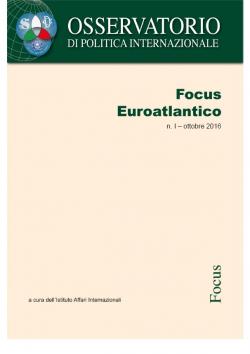Focus euroatlantico, n. 1 (ottobre 2016)
This edition of the Focus euroatlantico (Euro-Atlantic Focus), besides an analysis of the main events, also includes an evaluation of the new European Union Global Strategy (EUGS), by Lorenzo Vai (Istituto Affari Internazionali), which takes into account the different aspects – and the specific nature – of the document. Its main innovation, which makes it more ambitious than expected, is the fact that it aims not only to guide the EU’s external action, but also to relaunch and deepen the Union’s integration. This is a laudable and, for many aspects, a necessary goal, since, without a deeper level of integration, European foreign policy will remain incoherent and feeble. However, a huge amount of political will will be required to build concretely from such an ambitious EUGS. Only time will tell if the new Strategy will represent a turning point for the EU, or if intergovernmental strife will prevail, making it a dead document. Moreover, Marcello Di Filippo (Pisa University) examines the difficult debate on a new European policy on migration. Reforming Dublin III should be considered a priority of Italian foreign policy and, while it will doubtlessly be a difficult negotiation, there actually is some space for getting to a good agreement. Italy could in fact gain the support of other first-line countries and of countries which host large numbers of refugees and immigrants. This effort on Dublin III should be coupled with an effort in stemming the migration tide in countries of origin. The two goals are in fact complementary, since stemming the tide at the origin will require a long term effort: in the meantime, however, a change in EU migration policy is needed.
-
Details
Roma, Senato, 8 October 2016, 23 p. -
Issue
Focus euroatlantico 01
1. Un trimestre difficile per le relazioni transatlantiche, di Valerio Briani
Introduzione
Un futuro incerto
Conclusioni
2. La nuova strategia della politica estera e di sicurezza dell’Unione europea: globale, pragmatica ed esistenziale, di Lorenzo Vai
Introduzione
I contenuti della strategia
Le novità introdotte dalla strategia
Conclusioni
3. UE e migrazioni: la faticosa ricerca di una politica comune, di Marcello Di Filippo
1. Premessa
2. La sorveglianza degli spazi marittimi e le attività di soccorso
3. La “presa in carico” dei migranti e la condivisione di oneri e responsabilità: la falsa partenza della relocation
4. L’avvio del processo di revisione del sistema Dublino: un’occasione da sfruttare
Calendario eventi del prossimo trimestre
Topic
Tag
Related content
-
Ricerca01/01/2014
Focus on Transatlantic Relations
leggi tutto -
Ricerca18/06/2013
International Relations Observatory
leggi tutto



